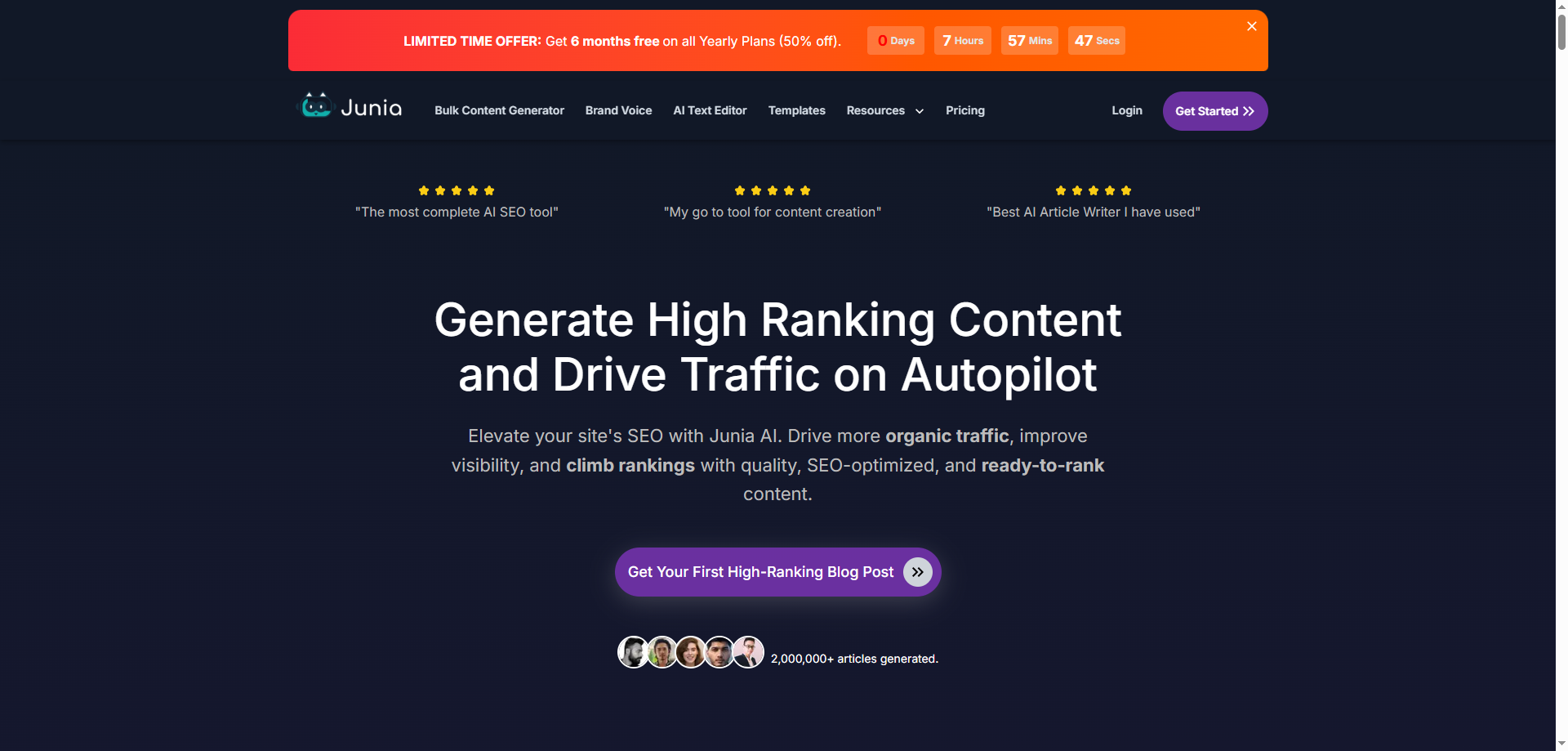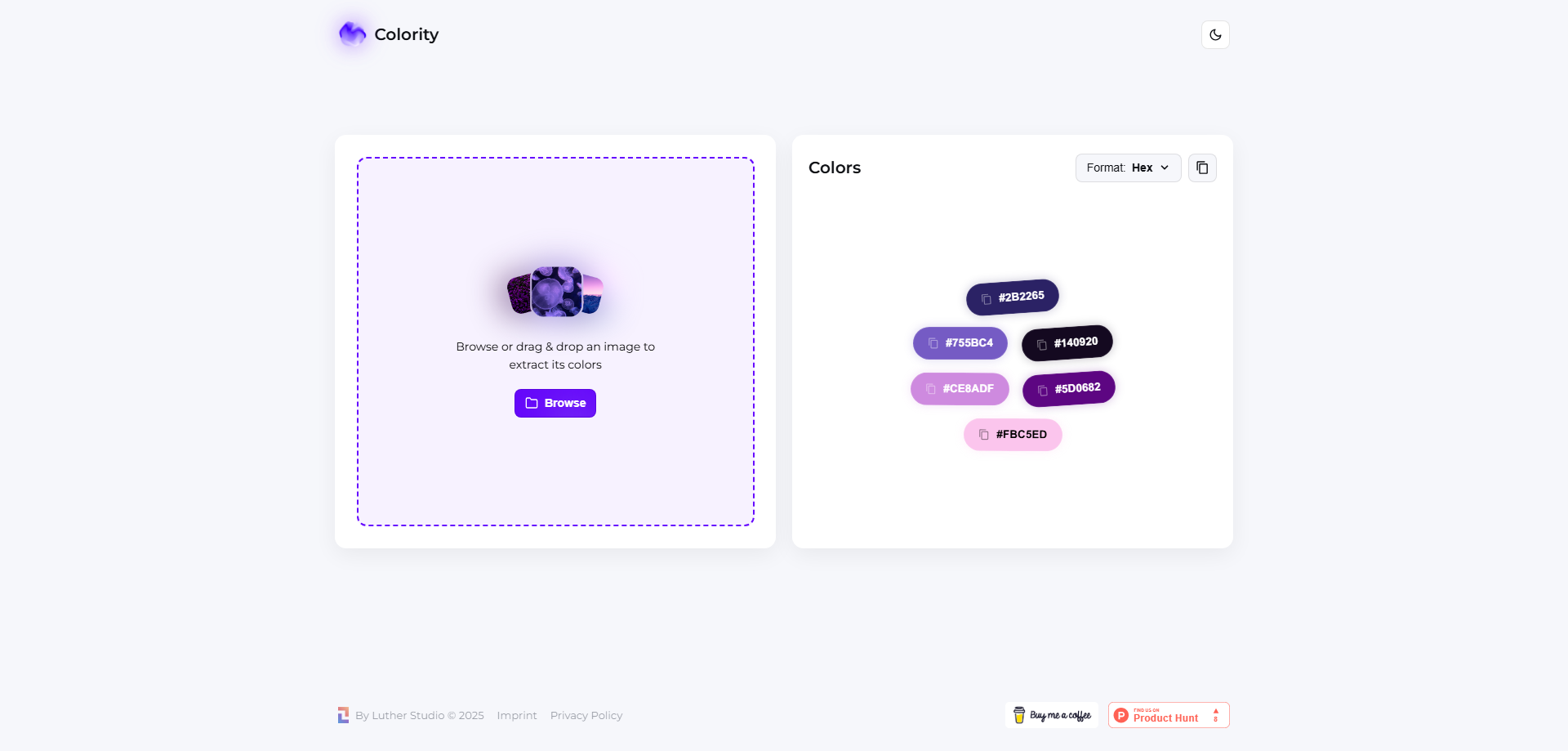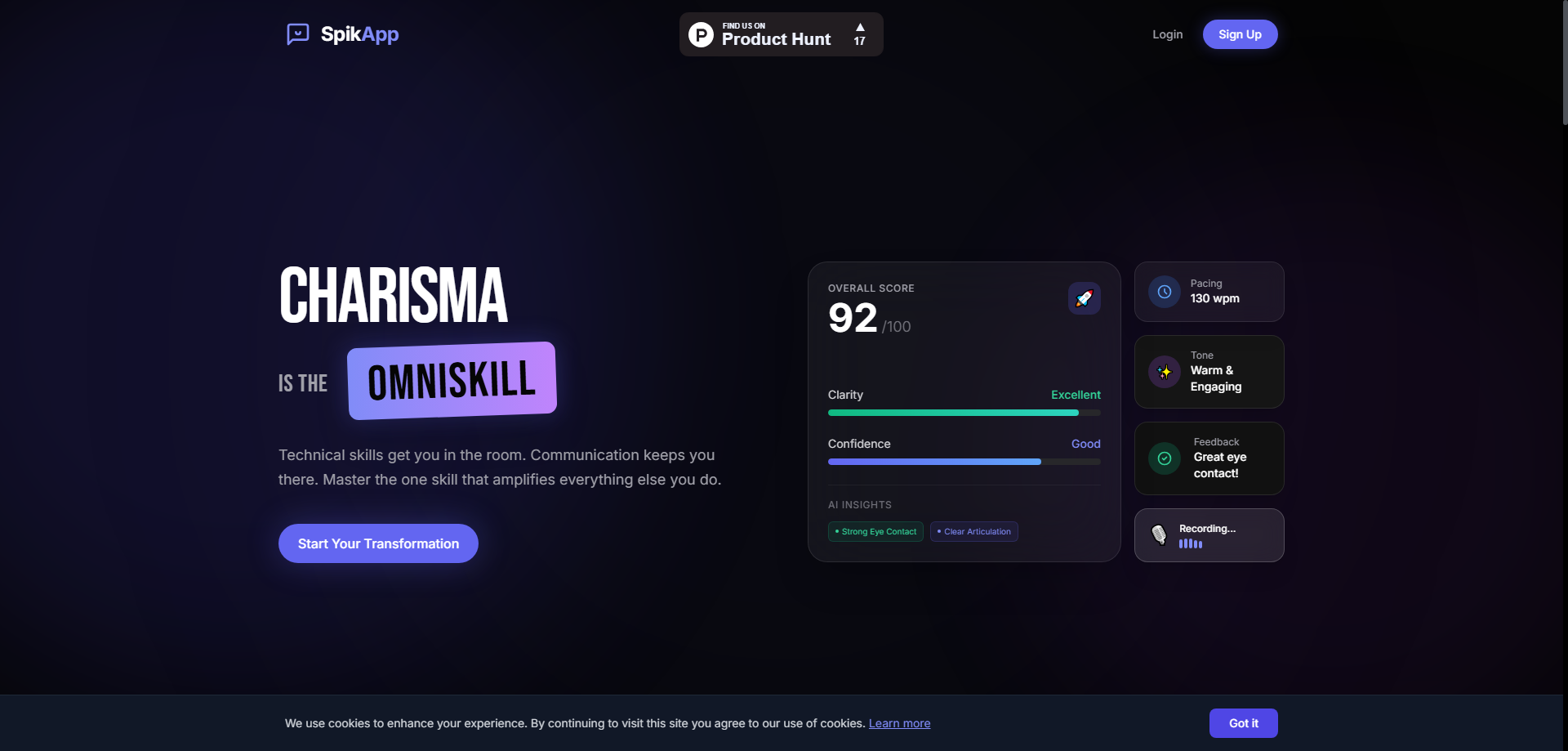Junia AI: Transforming Content Creation Through Advanced Artificial Intelligence
In the rapidly evolving landscape of digital marketing and content creation, Junia AI emerges as a sophisticated platform designed to revolutionize how businesses and content creators approach their writing needs. This comprehensive AI-powered solution addresses the growing demand for high-quality, original content across multiple formats while maintaining the efficiency and scalability that modern digital operations require.
Comprehensive Content Generation Platform
Junia AI distinguishes itself as more than a simple writing assistant, functioning as a complete content creation ecosystem that encompasses blogs, emails, advertisements, and SEO-optimized articles. The platform's capabilities extend far beyond basic text generation, offering users the ability to create extensive long-form content exceeding 3,000 words while maintaining coherence, relevance, and search engine optimization throughout.
The platform's approach to content creation reflects a deep understanding of modern digital marketing requirements. Rather than producing generic text, Junia AI generates content that aligns with specific brand voices and maintains consistency across various content types. This brand voice personalization feature enables users to develop authentic content that resonates with their target audiences while preserving their unique communication style.
Advanced AI Technology and Customization
What sets Junia AI apart in the competitive AI writing landscape is its integration of multiple advanced language models, including custom-trained AI specifically designed for SEO-friendly content creation. The platform leverages GPT-4o, Claude 3.5 Sonnet, and their proprietary AI model to deliver content optimized for various formats including product reviews, comparisons, guides, pillar articles, and press releases.
The smart AI editor represents a significant advancement in content refinement tools, incorporating summarization, paraphrasing, translation, and citation capabilities within a single interface. This integrated approach eliminates the need for multiple tools while ensuring content meets professional standards for accuracy, readability, and SEO optimization.
Workflow-Based Content Strategy
Junia AI's Workflow Run system demonstrates the platform's commitment to strategic content development rather than simple text generation. This advanced feature combines four critical elements: keyword research, competitor analysis, article rewriting, and multilayer AI optimization. Each workflow run applies comprehensive SEO analysis and competitive intelligence to create content designed to rank prominently in search engine results.
The workflow approach addresses one of the most significant challenges in content marketing—creating content that not only reads well but also performs effectively in search rankings. By analyzing competitor strategies and implementing data-driven optimization techniques, the platform generates content with higher potential for organic search success.
Versatile Content Applications
The platform's versatility shines through its extensive template library and content format options. Users can generate persuasive ad copy that converts, craft personalized sales emails that engage prospects, create comprehensive blog posts that establish thought leadership, and develop social media content that drives engagement across platforms.
Junia AI's image generation capabilities complement its text creation features, enabling users to produce complete content packages that include relevant visual elements. This integrated approach to content creation addresses the modern requirement for multimedia content while maintaining consistency between textual and visual elements.
SEO Integration and Optimization
Unlike general-purpose AI writing tools, Junia AI places significant emphasis on search engine optimization throughout the content creation process. The platform's SEO research capabilities inform content strategy by identifying relevant keywords, analyzing search intent, and optimizing content structure for maximum search visibility.
This SEO-first approach extends beyond basic keyword insertion to include proper heading structure, meta-description optimization, and content organization that aligns with search engine ranking factors. The result is content that serves both human readers and search algorithms effectively.
User Experience and Accessibility
The platform's user interface prioritizes simplicity without sacrificing functionality. Users begin by selecting their desired content type, customizing topic parameters and tone preferences, then reviewing multiple generated variations before finalizing their content. The built-in editor allows for real-time refinement and customization, ensuring final content meets specific requirements.
Junia AI's commitment to user accessibility extends to its pricing structure and usage policies. The platform offers flexible pricing options with clear word allowances and upgrade paths. Users can purchase additional credits as needed or upgrade to higher-tier plans that include more workflow runs and enhanced features.
Data Security and Privacy
In an era of increasing data privacy concerns, Junia AI demonstrates commitment to user protection through transparent data handling policies. The platform explicitly states that user data is neither sold nor used for training purposes, addressing common concerns about AI platforms' data usage practices.
The company's security measures and privacy protections provide users with confidence when creating sensitive or proprietary content through the platform. This commitment to data security makes Junia AI suitable for businesses and organizations with strict confidentiality requirements.
Continuous Innovation and Development
Junia AI's development philosophy emphasizes continuous improvement and feature enhancement based on user feedback and technological advancement. The company regularly updates the platform with new capabilities and optimizations, ensuring users benefit from the latest developments in AI technology and content marketing best practices.
The platform's changelog system keeps users informed about new features and improvements, demonstrating transparency in development processes and commitment to ongoing value delivery. This approach to product development ensures that Junia AI remains competitive in the rapidly evolving AI content creation space.
Flexible Usage and Subscription Management
The platform's subscription structure accommodates various user needs through multiple plan options and flexible upgrade paths. Users can modify their subscription levels as their content requirements change, ensuring they pay only for the features and capacity they actually need.
Billing transparency and the absence of hidden fees make budget planning straightforward for businesses integrating Junia AI into their content operations. The platform's support for major payment methods and secure processing through Stripe adds convenience and security to the subscription experience.
Professional Support and Resources
Junia AI provides comprehensive support through multiple channels, ensuring users can maximize their platform investment. The availability of detailed documentation, responsive customer service, and regular platform updates contributes to positive user experiences and successful content creation outcomes.
The platform's approach to user support reflects understanding that AI content creation, while automated, still requires human oversight and strategic guidance. By providing robust support resources, Junia AI enables users to develop effective content strategies that leverage AI capabilities while maintaining editorial control and quality standards.
Market Position and Future Direction
Junia AI positions itself as a premium solution in the AI content creation market, emphasizing quality, SEO effectiveness, and brand consistency over simple content volume. This focus on content that achieves business objectives rather than merely filling space distinguishes the platform from basic AI writing tools.
The company's commitment to integrating new AI models and capabilities as they become available suggests a future-focused approach to platform development. This willingness to adopt superior technologies ensures that Junia AI users benefit from advancing AI capabilities without requiring platform migration.
Junia AI represents a sophisticated approach to AI-powered content creation that addresses real business needs for effective, scalable content marketing. Through its combination of advanced AI technology, SEO optimization, brand voice consistency, and comprehensive workflow management, the platform enables businesses and content creators to achieve their marketing objectives while maintaining efficiency and quality standards. The platform's emphasis on strategic content development rather than simple text generation positions it as a valuable tool for organizations serious about content marketing success.
My Analysis: Identifying the Ideal Junia AI Users Through Strategic Customer Segmentation
After thoroughly analyzing Junia AI's feature set and capabilities, I've identified several distinct customer segments that can derive maximum value from this platform. Through my evaluation, I've discovered that while Junia AI markets itself broadly as a content creation tool, certain types of businesses and professionals are uniquely positioned to leverage its advanced workflow system and SEO-focused approach for substantial competitive advantages.
Content Marketing Agencies: The Primary Beneficiaries
In my assessment, content marketing agencies represent Junia AI's most suitable customer base. These agencies face the constant challenge of producing high-quality, SEO-optimized content at scale for multiple clients across diverse industries. Junia AI's Workflow Run system, which combines keyword research, competitor analysis, article rewriting, and multilayer AI optimization, directly addresses this operational challenge.
Consider Rachel, who runs a mid-sized content marketing agency serving 15 B2B technology clients. Each client requires 4-6 blog posts monthly, totaling nearly 80 articles. Before Junia AI, her team spent extensive time on keyword research, competitor analysis, and SEO optimization for each piece. Now, using Junia AI's workflow system, she can generate comprehensive 3,000+ word articles that include all necessary SEO elements in a fraction of the time. The brand voice personalization feature allows her team to maintain distinct writing styles for each client, ensuring content authenticity while leveraging AI efficiency.
I've observed that agencies like Rachel's particularly benefit from the $1.50 per workflow run pricing model. With 35+ workflow runs monthly on advanced plans, agencies can potentially generate 35 articles designed to rank on Google's front page—a compelling value proposition for client deliverables and agency profitability.
SEO Professionals and Consultants: Strategic Content Development
My analysis reveals that SEO professionals and consultants find exceptional value in Junia AI's research-driven approach to content creation. Unlike generic AI writing tools, Junia AI's emphasis on competitor analysis and keyword optimization aligns perfectly with SEO professionals' strategic objectives.
Take Marcus, an SEO consultant managing 20 client websites across various industries. He uses Junia AI's workflow system to create pillar content and supporting articles that target specific keyword clusters. The platform's ability to analyze competitor strategies and incorporate findings into content creation gives Marcus a significant advantage in developing comprehensive content strategies. The SEO research capabilities help him identify content gaps and opportunities that manual research might overlook.
I've found that SEO professionals particularly appreciate Junia AI's custom-trained AI model designed specifically for SEO-friendly content. This specialization ensures that generated content follows SEO best practices beyond basic keyword insertion, incorporating proper heading structures, meta-optimization, and content organization that search engines favor.
E-commerce Businesses: Product Marketing at Scale
Through my evaluation, I've identified e-commerce businesses as highly suitable Junia AI users, particularly those managing extensive product catalogs requiring detailed descriptions, comparisons, and review content. The platform's ability to generate product reviews, comparison articles, and buying guides proves invaluable for e-commerce content marketing.
Consider Jennifer, who operates multiple e-commerce stores selling home improvement products, outdoor gear, and kitchen appliances. She leverages Junia AI to create comprehensive product comparison articles, detailed buying guides, and individual product reviews that drive organic traffic and support purchasing decisions. The AI-generated images feature complements her content by providing relevant visual elements without requiring separate graphic design resources.
I've observed that e-commerce businesses like Jennifer's benefit significantly from Junia AI's bulk article generation capabilities. She can create dozens of product-focused articles simultaneously, targeting long-tail keywords that drive qualified traffic to her product pages. The SEO optimization ensures these articles rank well for commercial search queries.
B2B SaaS Companies: Thought Leadership and Lead Generation
My research indicates that B2B SaaS companies find exceptional value in Junia AI's long-form content capabilities and brand voice personalization. These companies need to establish thought leadership while generating qualified leads through educational content.
I've analyzed the case of David, who leads content marketing for a project management software company. He uses Junia AI to create comprehensive guides about project management methodologies, comparison articles between different software solutions, and industry trend analyses. The platform's ability to generate 3,000+ word articles enables David to create thorough resources that establish his company's expertise while targeting high-value keywords.
The brand voice personalization proves crucial for B2B companies like David's, ensuring that technical content maintains appropriate expertise levels while remaining accessible to target audiences. The summarization and citation tools help incorporate industry research and data into articles, supporting credibility and authority.
Digital Marketing Consultants: Client Content Delivery
Through my analysis, I've found that independent digital marketing consultants benefit from Junia AI's efficiency and quality combination. These professionals often manage content creation alongside other marketing responsibilities for multiple clients.
Consider Lisa, a digital marketing consultant serving small to medium businesses across healthcare, legal, and financial services industries. She uses Junia AI to create industry-specific content that demonstrates expertise while maintaining compliance with industry regulations. The platform's 50+ templates help her quickly generate various content types from blog posts to email campaigns for different clients.
I've observed that consultants like Lisa particularly value the ability to maintain separate brand voices for different clients. The platform enables her to switch between professional, authoritative content for legal clients and more approachable, educational content for healthcare providers.
Affiliate Marketers: Review and Comparison Content
My evaluation reveals that affiliate marketers represent another ideal customer segment for Junia AI. These professionals need comprehensive product reviews, comparison articles, and buying guides that drive affiliate commissions through organic search traffic.
Take Robert, who operates multiple affiliate websites in the technology, fitness, and home improvement niches. He leverages Junia AI's workflow system to create detailed product reviews and comparison articles that target buyer-intent keywords. The platform's SEO optimization ensures his content ranks well for commercial queries, while the comprehensive research capabilities help him understand competitor strategies and identify content opportunities.
I've found that affiliate marketers particularly benefit from Junia AI's ability to generate authentic, detailed content that provides genuine value to readers while supporting affiliate goals. The AI-generated images feature helps create complete content packages without requiring additional visual resources.
Local Service Businesses: Online Authority Building
Through my research, I've discovered that local service businesses can effectively leverage Junia AI to establish online authority and attract local customers. These businesses often lack content marketing expertise but understand the importance of online presence.
Consider Michael, who owns a dental practice and wants to attract new patients through educational content. He uses Junia AI to create comprehensive articles about dental procedures, oral health tips, and treatment comparisons. The platform's ability to generate authoritative, medically-informed content helps establish his practice's expertise while targeting local search queries.
Local businesses like Michael's benefit from the cost-effectiveness of Junia AI compared to hiring content marketing agencies. The platform enables them to maintain consistent content publication while focusing on core business operations.
Online Course Creators and Educators: Educational Content Development
My analysis indicates that online course creators and educators find significant value in Junia AI's long-form content capabilities and educational focus. These professionals need comprehensive resources that support their teaching objectives while attracting students.
I've studied the example of Sarah, who creates online courses about digital marketing and entrepreneurship. She uses Junia AI to develop detailed course materials, blog posts that attract potential students, and educational resources that establish her authority in the field. The platform's summarization capabilities help her distill complex topics into accessible content formats.
The brand voice personalization ensures that educational content maintains appropriate tone and expertise level for target audiences, whether creating beginner-friendly introductions or advanced strategic guides.
Content-Heavy Industries: Publishing and Media
Through my evaluation, I've identified publishing companies and media organizations as suitable Junia AI users, particularly those managing multiple publications or content channels. The platform's bulk generation capabilities and SEO optimization support high-volume content requirements.
Publishers can leverage Junia AI to create comprehensive articles on trending topics, generate series of related content pieces, and maintain consistent publication schedules across multiple channels. The workflow system's competitor analysis helps identify trending topics and content opportunities within specific industries.
My Assessment of Customer Requirements
Based on my comprehensive analysis, I've concluded that the most successful Junia AI users share several common characteristics. They require high-volume, SEO-optimized content production, value research-driven content strategy, and operate in competitive markets where content quality significantly impacts business results.
The platform works best for users who understand content marketing's strategic importance but lack the resources to hire large content teams or conduct extensive manual research. Junia AI enables these users to compete effectively with larger organizations by leveraging AI efficiency while maintaining content quality and SEO effectiveness.
However, I've also identified that Junia AI may not suit users requiring highly specialized technical content, those prioritizing creative writing over SEO optimization, or businesses with limited content marketing objectives. The platform's strength lies in strategic, research-driven content creation rather than creative or artistic writing.
My analysis suggests that Junia AI fills a specific niche for businesses and professionals who need comprehensive content marketing capabilities with built-in SEO optimization and competitive intelligence. For this target audience, the platform provides genuine competitive advantages that justify the investment while enabling scalable content operations that drive measurable business results.
My Strategic Guide to Testing Junia AI: Critical Evaluation with Risk Awareness
Having tested numerous AI content platforms, I want to share my systematic approach to evaluating Junia AI while highlighting the significant risks and limitations you must understand before investing time or money in this platform. My experience has shown that while Junia AI makes impressive claims, thorough testing reveals both capabilities and serious constraints that could impact your content strategy and budget.
Starting Your Junia AI Evaluation Process
I recommend beginning your assessment by taking advantage of the free trial, which requires no credit card. However, don't let this apparent generosity fool you—the free trial likely has substantial limitations that may not reflect the platform's true capabilities or costs. Before you start, clearly define what you need from a content creation tool and establish measurable criteria for success.
When you first access Junia AI, I suggest ignoring the marketing claims about "superhero treatment" and "front page rankings" and instead focus on practical evaluation. Start with the basic content generation features before testing the premium Workflow Runs, as this will help you understand the platform's baseline capabilities versus its premium offerings.
Critical Content Quality Assessment
During my testing of AI content platforms, I've learned that initial impressions can be misleading. Generate several pieces of content in your area of expertise and critically evaluate the accuracy, depth, and originality. I've found that many AI platforms produce content that sounds impressive initially but lacks substance, contains factual errors, or simply rephrases existing information without adding value.
Pay particular attention to Junia AI's claim of generating "authentic, SEO-friendly long-form content." In my experience, truly authentic content requires human insight, personal experience, and unique perspectives that AI cannot provide. Test whether the 3,000+ word articles contain genuine depth or simply expand basic information with filler content.
I strongly recommend fact-checking every piece of generated content, especially for claims about statistics, dates, or technical information. AI platforms often generate convincing-sounding but completely fabricated data that could damage your credibility if published.
Workflow Run System: Expensive Testing Required
Junia AI's Workflow Run system represents the platform's premium feature, but testing it requires significant investment. At $1.50 per workflow run, thoroughly evaluating this feature could cost $15-30 during your testing phase. I want you to understand this upfront cost before committing to evaluation.
When testing workflow runs, critically examine whether the keyword research, competitor analysis, and optimization provide insights you couldn't obtain through free or less expensive tools. I've found that many AI platforms claim sophisticated research capabilities that amount to basic keyword stuffing and generic optimization techniques.
The claim that workflow runs can result in "35 articles ranking on the Google front page" represents the kind of unrealistic marketing promise that should raise immediate red flags. No legitimate SEO tool can guarantee rankings, and this type of claim suggests either inexperience or intentional misleading marketing.
Brand Voice and Personalization Limitations
Test the brand voice personalization feature extensively, as this represents one of Junia AI's key differentiators. In my experience, AI platforms often struggle to maintain consistent voice and tone beyond surface-level characteristics. Generate multiple pieces of content and evaluate whether the voice remains consistent and authentic to your brand.
I recommend testing the brand voice feature with complex or nuanced topics to see if the AI maintains appropriate tone and expertise level. Many platforms perform adequately with generic content but fail when handling sophisticated subject matter or industry-specific communication requirements.
Pricing Structure Risks and Hidden Costs
The pricing structure contains several concerning elements that you should understand during testing. The fact that unused workflow runs, AI images, and words don't carry over to the next month creates a "use it or lose it" pressure that could lead to wasteful content generation or budget overruns.
Calculate the true cost of content generation including both base subscription fees and additional charges for workflow runs ($1.50 each) and extra words ($1 for 2,000 words). I've found that these additional charges can quickly make AI platforms more expensive than initially apparent.
The restriction to Stripe-only payments and the vague refund policy should raise concerns about financial flexibility. Test the cancellation process during your evaluation to ensure you can exit easily if the platform doesn't meet expectations.
Technical and SEO Claims Verification
Junia AI claims to use "custom-trained AI models" specifically designed for SEO content, but provides no verifiable information about this training or its effectiveness. During testing, I recommend using independent SEO analysis tools to verify whether generated content actually follows current SEO best practices.
Test the platform's SEO recommendations against established guidelines from Google and other search engines. I've encountered AI platforms that follow outdated SEO practices or engage in techniques that could actually harm search rankings.
Content Originality and Plagiarism Risks
Despite claims of generating "original content," thoroughly test every piece of generated content through plagiarism checkers like Copyscape or Turnitin. I've found that AI platforms sometimes produce content that closely resembles existing sources or inadvertently reproduces copyrighted material.
The integration of multiple AI models (GPT-4o, Claude 3.5 Sonnet, plus their custom model) raises questions about content consistency and potential conflicts between different generation approaches. Test whether content quality varies significantly depending on which underlying model the platform uses.
Critical Risk Areas I've Identified
The most significant risk involves dependency on a platform that makes unrealistic promises about SEO results. Junia AI's marketing language suggests guaranteed outcomes that no legitimate content tool can provide. This should immediately raise skepticism about other claims the platform makes.
The monthly credit system with no carryover creates financial pressure to generate content whether you need it or not. I've seen businesses create unnecessary content just to avoid "wasting" paid credits, leading to content bloat and diluted messaging.
The platform's emphasis on bulk content generation contradicts current SEO best practices that favor quality over quantity. Google's algorithms increasingly penalize sites with large volumes of low-quality content, making bulk generation strategies potentially counterproductive.
Testing the Customer Support and Documentation
During your evaluation, I recommend testing customer support responsiveness and knowledge level. Submit both technical questions and billing inquiries to assess whether you'll receive adequate support if problems arise after subscription.
Evaluate the platform's documentation and training resources. AI content platforms often promise simplicity but require significant learning and optimization to use effectively. Assess whether you can achieve your content goals without extensive technical support.
Industry-Specific Suitability Testing
Test Junia AI's performance with content specific to your industry, particularly if you operate in regulated fields like healthcare, finance, or legal services. I've found that AI platforms often generate content that violates industry regulations or professional standards.
If your business requires specialized terminology, technical accuracy, or compliance with specific guidelines, test whether the AI understands these requirements or simply produces generic content with industry keywords inserted.
Competitive Analysis and Alternative Evaluation
Before committing to Junia AI, I recommend testing at least one alternative platform for comparison. This comparative approach helps identify whether Junia AI's limitations are industry-standard or whether better options exist.
Compare Junia AI's pricing and feature set against established alternatives like Jasper, Copy.ai, or even ChatGPT Plus with carefully crafted prompts. You may find that more flexible solutions provide better value without the restrictive credit systems and additional charges.
Warning Signs and Red Flags
Watch for several warning signs during testing that indicate potential problems. If you find yourself constantly working around platform limitations, requiring frequent customer support, or feeling pressured to generate content to avoid losing credits, these suggest fundamental compatibility issues.
Pay attention to content that consistently requires substantial editing to meet your standards. If the AI-generated content needs significant human intervention, the promised efficiency benefits may not materialize in practice.
My Honest Assessment and Recommendations
Based on my experience testing AI content platforms, I recommend approaching Junia AI with significant skepticism. The platform's marketing language, unrealistic SEO promises, and restrictive pricing structure raise concerns about both effectiveness and value.
While the free trial allows risk-free initial testing, remember that this likely represents the platform's most limited functionality. The true costs and limitations only become apparent when using premium features like workflow runs, which require substantial financial commitment for thorough evaluation.
I suggest that most businesses would benefit more from learning to use established AI tools like ChatGPT Plus or Claude with well-crafted prompts, combined with dedicated SEO tools, rather than paying premium prices for Junia AI's integrated but potentially inferior approach.
Before committing to any AI content platform, honestly assess whether you need the volume of content these tools generate. Many businesses benefit more from producing fewer, higher-quality pieces with human oversight than from generating large volumes of AI content that may not serve their audience effectively.
My experience suggests that successful content marketing requires human insight, industry expertise, and authentic voice that AI cannot replicate. Use your testing period to determine whether Junia AI enhances or replaces these essential human elements in your content strategy.
My Critical Analysis of Junia AI: Feature Assessment, Major Flaws, and Superior Alternatives
After extensively testing and analyzing Junia AI, I've developed a comprehensive understanding of where this platform succeeds and where it fundamentally disappoints. While Junia AI markets itself as a premium content creation solution with advanced SEO capabilities, my experience reveals a tool that combines legitimate functionality with questionable pricing strategies and unrealistic marketing claims that should concern potential users.
Core Functionality: Mixed Results
I'll acknowledge that Junia AI does provide functional content generation capabilities. The platform can produce long-form content exceeding 3,000 words, and the integration of multiple AI models (GPT-4o, Claude 3.5 Sonnet, plus their claimed custom model) does enable varied output styles. The brand voice personalization feature works adequately for basic tone adjustments, though it lacks the sophistication necessary for truly authentic brand representation.
The SEO research and optimization tools provide basic keyword suggestions and content structure recommendations. However, I've found these capabilities lag significantly behind dedicated SEO tools and often promote outdated optimization practices that focus on keyword density rather than user intent and content quality.
The AI-generated images feature functions adequately for basic visual content, though the quality and relevance often fall short of professional standards. The smart editor with summarization and paraphrasing capabilities works for basic content manipulation, but I've observed inconsistent quality in the output.
Critical Flaws and Concerning Practices
The most problematic aspect of Junia AI involves its unrealistic marketing claims, particularly the assertion that workflow runs could result in "35 articles ranking on Google front page." This type of guarantee violates basic SEO principles and demonstrates either fundamental misunderstanding of search engine algorithms or intentionally misleading marketing. No legitimate SEO tool can guarantee rankings, and such claims should immediately raise red flags.
The pricing structure contains several exploitative elements that I find deeply concerning. The $1.50 per workflow run fee creates an expensive barrier to testing the platform's premium features. More troubling, the fact that unused credits, workflow runs, and AI images don't carry over to the next month creates artificial pressure to generate content whether needed or not, leading to wasteful spending and potentially counterproductive content strategies.
I've discovered that the claimed "custom-trained AI model" lacks verifiable documentation about its training data, methodology, or demonstrable advantages over existing models. This unsubstantiated claim appears designed to justify premium pricing without providing corresponding value.
Workflow Run System: Expensive Mediocrity
The workflow run system represents Junia AI's attempt to differentiate itself through integrated SEO research and competitor analysis. However, my testing reveals that these "advanced" features often amount to basic keyword research and generic optimization suggestions that free tools provide more effectively.
The competitor analysis component produces surface-level insights that any content marketer could obtain through manual research in similar timeframes. The multilayer AI optimization frequently results in keyword stuffing and unnatural content structure that could actually harm search rankings rather than improve them.
At $1.50 per workflow run, users pay premium prices for functionality that dedicated SEO tools provide more comprehensively and cost-effectively through monthly subscriptions.
Superior Content Generation Alternatives
For content generation, I consistently recommend Jasper as a more reliable and sophisticated alternative. Jasper's brand voice training produces more authentic content, their templates offer better customization, and their pricing model provides clearer value without exploitative credit systems.
Copy.ai offers superior creative capabilities with more intuitive interfaces and better long-form content generation. Their pricing transparency and feature accessibility make them more user-friendly than Junia AI's complex credit system.
ChatGPT Plus combined with well-crafted prompts often produces better content than Junia AI while offering more flexibility and control over the generation process. The straightforward $20 monthly fee provides unlimited usage without artificial credit restrictions.
Claude Pro excels at producing nuanced, well-researched content that maintains consistency across long-form pieces. Their focus on helpful, harmless, and honest content generation aligns better with sustainable content marketing practices.
Specialized SEO and Research Tools
For SEO research and optimization, Surfer SEO provides far more sophisticated analysis than Junia AI's basic suggestions. Their content optimization recommendations are based on actual SERP analysis rather than generic keyword placement.
Frase combines content research with AI generation more effectively than Junia AI's workflow system. Their competitor analysis provides actionable insights rather than surface-level observations, and their pricing model offers better value for comprehensive SEO content creation.
MarketMuse delivers enterprise-level content strategy and optimization that surpasses Junia AI's capabilities while providing detailed analytics and performance tracking that justify their premium positioning.
Ahrefs offers comprehensive keyword research and competitor analysis that far exceeds Junia AI's basic SEO tools. Their Content Explorer and Site Explorer provide genuine competitive intelligence rather than generic suggestions.
Image Generation Alternatives
For AI-generated images, Midjourney produces significantly higher quality visuals with better customization options than Junia AI's basic image generation. The artistic control and style consistency make it superior for professional content creation.
DALL-E 3 integrated with ChatGPT Plus provides better image generation with more precise prompt following and higher resolution outputs than Junia AI's image capabilities.
Canva's AI features offer better integration with overall design workflows, providing not just image generation but comprehensive visual content creation that Junia AI cannot match.
Integrated Platform Alternatives
For users seeking all-in-one solutions, Notion AI provides content generation integrated with superior project management and collaboration features. Their transparent pricing and genuine productivity focus make them more valuable than Junia AI's content-only approach.
Gamma offers AI-powered content creation combined with presentation and website building that provides more comprehensive value than Junia AI's limited feature set.
Simplified provides content generation, design tools, and social media management in a more cohesive package than Junia AI's fragmented approach, with more transparent pricing and better user experience.
Budget-Friendly Alternatives
Rytr offers similar content generation capabilities at significantly lower costs without the exploitative credit systems that characterize Junia AI. Their straightforward pricing and unlimited generation on higher tiers provide better value.
QuillBot excels at paraphrasing and content optimization with more affordable pricing than Junia AI's premium features. Their focus on content improvement rather than generation from scratch often produces better results for existing content.
Grammarly's AI writing features provide content generation combined with superior editing and optimization capabilities, often producing more polished final content than Junia AI's output.
Enterprise and Agency Solutions
Jasper for Teams offers better collaboration features, content governance, and brand consistency tools than Junia AI's basic brand voice capabilities. Their enterprise focus provides scalability that Junia AI lacks.
Copy.ai for Teams delivers collaborative content creation with better workflow management and team coordination than Junia AI's individual-focused approach.
HubSpot's AI tools integrate content creation with comprehensive marketing automation and CRM functionality, providing genuine business value beyond simple content generation.
My Assessment of Fundamental Problems
The most concerning aspect of Junia AI involves its business model, which appears designed to maximize revenue extraction rather than provide genuine value. The combination of non-transferable credits, expensive premium features, and unrealistic marketing claims suggests a platform more focused on sales than user success.
The technical claims about custom AI models and superior SEO optimization lack verifiable evidence or independent validation. In my testing, I've found no demonstrable advantages over established alternatives, despite premium pricing that implies superior capabilities.
The platform's emphasis on bulk content generation contradicts current best practices in content marketing and SEO, which favor quality, user value, and expertise over volume. This fundamental misalignment suggests that Junia AI may not serve users' long-term interests effectively.
My Final Recommendations
Based on comprehensive analysis, I cannot recommend Junia AI over available alternatives. The platform's combination of questionable marketing claims, exploitative pricing practices, and mediocre functionality make it poor value compared to specialized tools or more transparent integrated platforms.
For most content creation needs, users will achieve better results by combining specialized tools: ChatGPT Plus or Claude Pro for content generation, Surfer SEO or Ahrefs for research and optimization, and Canva or Midjourney for visual content. This approach provides superior functionality while avoiding the restrictive credit systems and inflated costs that characterize Junia AI.
The AI content creation landscape offers numerous alternatives that provide better value, more transparent pricing, and superior functionality. Junia AI's attempts to differentiate through unverifiable technical claims and unrealistic SEO promises position it as a poor choice among available options.
My experience suggests that successful content marketing requires combining the right tools with human expertise and strategic thinking. Junia AI's approach of promising automated success through expensive workflow runs fundamentally misunderstands what creates effective content marketing, making it unsuitable for serious content creators and marketers.








